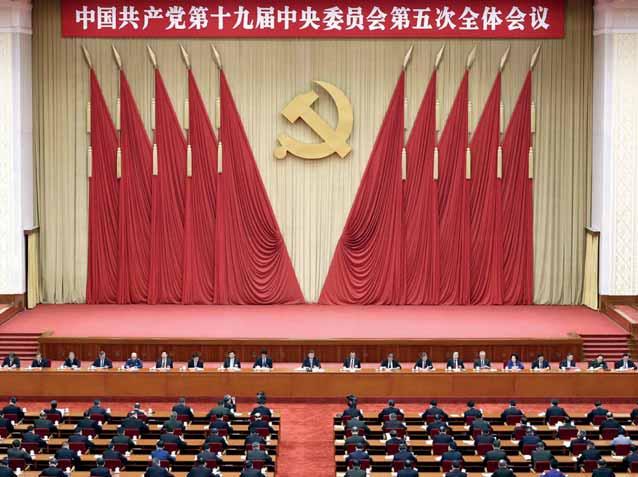
23 minute read
POLITICS
from Issue #1299
Communist China Is Bad for Georgia, and It’s Time to Cut Them Out
Photo by Liu Bin / XINHUA NEWS AGENCY via AP OP-ED BY MICHAEL GODWIN
Advertisement
The Communist Chinese Party (CCP) has increasingly come into the spotlight as more investigations are launched and evidence surfaces about their involvement in the origins of the COVID-19 virus. From their lesser known human rights violations with the Uighers in their western provinces to the abuse and murder of protestors in the occupied nation of Taiwan, China is the world’s latest “evil empire.” Now, Georgia has become a part of the sphere of CCP infl uence, and it is imperative that Tbilisi realize this and save themselves and their nation while holding the CCP accountable.
First needed is an examination of the way China views modern warfare, or more accurately, the fact it doesn’t fi ght war in our traditional sense. In stark contrast to the Western classical focus on physical military strength and hardware, China focuses on what it has termed, and literally wrote the book on, Unrestricted Warfare. This work, published in 1999, takes a keen view of combating the West in information censorship, media control, economic infl uence, and ultimately political seizure.
The authors, Qiao Liang and Wang Xiangsui, were both colonels in the People's Liberation Army (PLA). These offi cers postulated that the world and the function of warfare was radically changed after the 1991 Gulf War. They determined that the United States, and the West by proxy, had had their last major accomplishment and the way confl ict will play out will be different. This change was outlined by Qiao in an interview after publication by saying, “the fi rst rule of unrestricted warfare is that there are no rules, with nothing forbidden.”
This strategy, due to its nature, can be used against both enemies as well as allies through the universal incentive: money. Georgia is being wooed into a sense of complacency by the injection of billions of dollars of foreign direct investment. From the Senaki highway project to the Tbilisi Sea New City, bringing Georgia deeper into the economic clutches of the CCP is top priority. This economic bait is too sweet for Tbilisi to turn down, but will hurt in the long run. Being indebted to Beijing is tantamount to owing large sums of money to the mob, particularly for a small nation such as Georgia.
While Russia and Turkey are expanding in the South Caucasus militarily, China has chosen the alternate route of economic enslavement through large investments and import/export control, undermining any of the competing military or political achievements. In addition, this also ensures longer term control of the region.
Already on a global scale, the slight surface ripples of the undercurrent of CCP actions are becoming more visible. Media, political, and economic platforms are being probed with their dark tendrils, albeit mostly focused on undermining the United States. Georgia is still, as a member of the West, a viable target and will not be left untouched by the CCP globalization strategy.
This all began after the rise of Communist China, and the exile of the democratic government to the island nation of Taiwan, still besieged by their northern neighbors. The United States, and much of the West as a whole, thought that commercially engaging with the CCP would mellow their radical communist sentiments. It didn’t, but it did serve the temporary purpose of pulling them away from the Soviet Union.
In fact, with the increased economic activity, the beast only grew in size. China managed to build itself as a home of cheap labor, luring Western companies to be betrothed to their workforce and therefore the CCP. This allows the CCP to slither through these corporate entities and into the cultures and societies in other nations that would be otherwise angled perpendicular to communist ideals. This tactic of normalization numbs the people to the horrors of Chinese communism and its deadly grasp.
At the same time, they whitewash their own global reputation through a ruthless regime of censorship and shadow policing and law enforcement. Any dissidents swiftly “disappear” and their words are scrubbed from the media. Socio-political and cultural “opponents” are interred in concentration camps and hidden from the world, with the goal of forcing people to forget. Any warm interaction with a government that conducts itself in such a manner, treats its people in such an abhorrent manner, and remains so devious and manipulative, is despicable.
It is imperative that Georgia rethink its position with the CCP and their policies. The continuation of these actions is clearly motivated by profi t and growth, and this is not without its benefi ts. However, to go without recognizing the horrifying faults of the CCP is to condone them. From the abhorrent “One China Policy” to the abuse and murder of its own citizens, Georgia, along with the rest of the world, needs to make it clear in no uncertain terms that this malicious behavior by a state entity will not be tolerated.
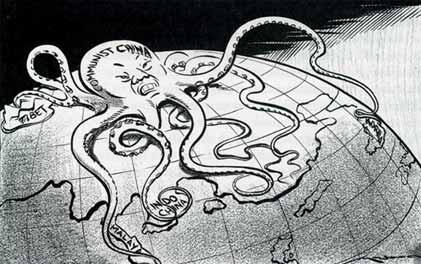
Cartoon by Gordon Edward George Minhinnick
Handling the Occupation
OP-ED BY NUGZAR B. RUHADZE
Anything good and useful that is currently happening in Georgia is losing its color and value against the background of the Occupation that we have been suffering from the last 30 something years. I am purposefully capitalizing the word ‘Occupation,’ because it has turned into the most capital issue Georgia has had to handle in its recent history.
The fact of losing Abkhazia and Samachablo is absolutely indigestible for every single Georgian of any age, gender or faith. We are simply not capable of putting up with the reality that life offers at this stage of our existence. We sleep and dream of these lands coming back to us, but we have not the slightest clue how to actually do it: no plan, no power, no will, no resource, no hope, no nothing!
The world around us is aware of our pain, but the same world needs to do so much to ensure its own survival, that it has no will or muscle to turn our territorial issue into its core subject of care and preoccupation. Without an iota of exaggeration, our life is losing gist and taste because of the Occupation imposed on us by our northern neighbor only thanks to the power it is allowed to exercise over us.
Russia is angry with Georgia, and its anger is fi erce and lasting, and there is no way to assuage that anger because, naturally, Russians honor in the fi rst place their own state and political interests above others’. Georgia became the ‘other’ for Russia as a result of Georgia’s decision to follow the western moral and political ideals, and its ability to make a human being happier than Russians can and would any time soon. To play a double game, including Georgia’s goodwill gestures towards both, seems to be practically impossible, because Russia tends to maintain a categorical attitude: either us or them. Living in a presumable triangle between Russia, Georgia and the West has not worked, although this geopolitical model might have been ideal for Georgia.
Time is passing and the so called ‘new reality’ is crystallizing little by little, turning into a genuine nightmare for us, because the more the world gets used to the irritating status quo, the more impotent we feel ourselves in our ability to revive our territorial integrity. Moreover, the new generations are coming of age, forfeiting the acute sense of lost lands, their mindset gradually numbing towards the anguish of those that came before them.
Concerning the Western shoulder, we certainly have it to cry on, but only in lighter things like strengthening liberal democracy and honing our electoral culture. We should in no way be nursing the hope that the West is capable of having Russia return to Georgia its lost lands: it can only implement the policy of that loud label, ‘non-recognition’. Non-recognition is fi ne, but it is only a piece of moderate diplomacy, having no problemsolving strength or value. And everybody knows that! Only, the overall picture stays on a shoulder-shrugging and lip-curving level. Not hard to understand, because, to put it straight, our beloved West has no power to make Russia drop Abkhazia and South Ossetia like a hot potato at one snap of a fi nger, have the happy Armenian immigrants out and the miserable Georgian refugees in, reinstating their illegally lost properties, and closing the issue forever. Things just don’t happen that way. Wars change things, sometimes so badly that recovery becomes impossible, and we are the victims of that change. In our hearts and minds, we are not prepared to reconcile ourselves with the fact, but we will have to fi nd better ways to put back together our beloved motherland. Dreaming never hurts, and I will now follow one of the images of my best imagination: some day in the future, the world will not need borders, and that’s exactly when we will be able to relax and ignore the consequences of wars and borderization, visas and other restrictions, territorial quarrels and barbed wire installations. Wouldn’t this be something? I know that jokes are irrelevant about things like occupation and geopolitically broken hearts, but can’t we at least afford this little jovial moment when pain stays and has no intention to go?
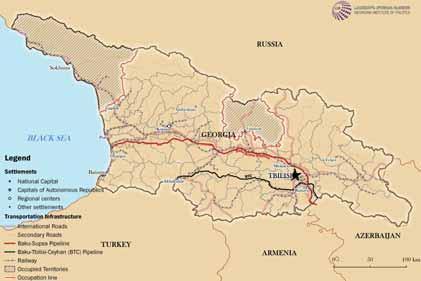
Namakhvani Updates: Arrests, Support from Abroad
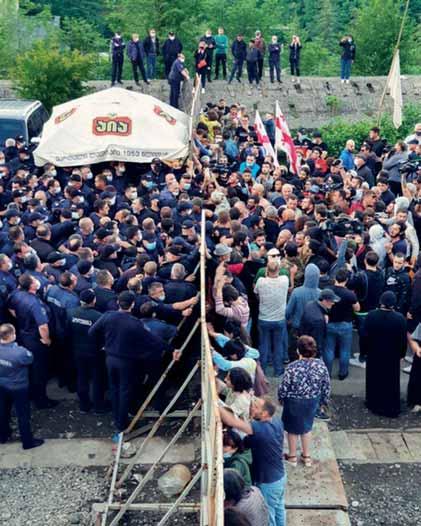
Protestors block the entrance to the site so no workers or equipment can enter. Source: 'To Save the Rioni Valley'
BY TEAM GT
Opponents of the construction of Namakhvani HPP in the village of Gumati gathered at the base of Enka Renewables this week in an attempt to prevent the construction equipment and workers of Enka accessing the construction site.
It followed on from last Friday’s clash outside the construction site after protesters spent the night throwing rocks at and hitting the metal barriers erected around the site. Eight people were detained as a result.
Varlam Goletiani, spokesperson for the protestors, said, “This shameful barricade is a symbol of repression in independent Georgia. It prevents each of us from going home. Nothing more can be done than this: the HPP here is a minor issue when there is a barricade preventing us from going home.
“The conversation is not about whether we invade somewhere or we damage something: it has been 214 days since we have been in the valley and we have not damaged anything, we have not invaded anywhere. We want to move. We will see who breaks who in the end,” he said.
Of the latest blockade of vehicles and staff, one of the protesters, Marita Museliani, noted they were only trying to stop the transporting of equipment, not to break the law.
“We will try to control everything so that we don’t break the law. Becoming destructive is unacceptable to us, what with the [May 29] clash, and daily tensions rising. We don’t want to lose control of this situation and will aim to stay constructive. We are dealing with a big violation by the government, and people are fi nding it very diffi cult to control their emotions. We will try not to let these emotions cross the lines,” Museliani told reporters.
Goletiani claimed that the police forces have now become an offi cial helper to Enka.
“We saw a convoy passing through of police pickups taking the company employees and workers onto the site, as we are blocking their access otherwise. The police are taking them to work. It is important to block the road so as not to let them transfer equipment to the other side, which the company needs to continue work.
“We cannot get into a confrontation with the police, it isn’t right and we’re not going to go in that direction. But it’s necessary for the public to know that the police have completely violated the law because it is not their function or duty to drive Enka employees into the gorge with their own cars,” Goletiani said.
Almost as if in response to this sentiment, on June 2, Zurab Khmelidze, Assistant Detective / Investigator in the Vani District, expressed his solidarity with the Rioni Valley Guardians by resigning. An interview with him was broadcast by Mtavari TV.
“I want to make a direct statement about my leaving my job. What’s happening in Namokhvani led me to it. I express my solidarity with Varlam Goletiani, Maka Suladze, and every person standing there, whose constitutional right is being illegally violated, with their being prevented from accessing their own property.
“The police, and me previously with them, are splitting the valley in two... these people who actually lived there have parents, have houses, and we are restricting their right to move freely. It has a huge impact on a person's selfesteem, conscience, and dignity. An ordinary citizen wants to fi ght for their country and you are a uniformed offi cer of the law who owes it to his own citizens to protect and defend the land, and yet you are…actually hindering them.
“Many of my colleagues agree with me. The guys are in a very bad situation. Everyone is on edge. Many want to leave the system but they don't dare to because they have families to support,” he said.
Heidi Hautala, Vice President of the European Parliament, a member of the ‘Greens’, responded to the protest against Namakhvani HPP, noting that the lack of transparency and accountability with “secret contracts” is shocking.
Hautala gave her support to the protest movement via a post on Twitter.
“I welcome this new kind of mobilization of people of #Georgia against a backward and destructive economic model. Lack of transparency and accountability with secret contracts is shocking. #Namakhvani,” she wrote.

The Prime Minister of Georgia welcomes the Prime Minister of Ukraine, both eager for their countries to join NATO. Source: Facebook
BY TEAM GT
On June 3, Georgian Prime Minister Irakli Garibashvili met with Denys Shmyhal, Prime Minister of Ukraine, during the latter’s two-day visit to Georgia. The face-to-face meeting at the Administration of the Georgian Government saw the two emphasizing the special friendship and strategic partnership between the two countries.
The parties discussed the situation in the Black Sea Region and regional security, underlining the Georgian side's position on its commitment to a peaceful confl ict resolution policy. The PM of Georgia thanked his Ukrainian counterpart for strongly supporting Georgia's sovereignty and territorial integrity.
The meeting also revolved around threats from Russia and the dire consequences of occupation, a challenge shared by both Georgia and Ukraine. Garibashvili expressed deep concern over Russia's military buildup on Ukraine's borders and its temporary occupation of Crimea. He reassured his Ukrainian colleague of his fi rm support for Ukraine's sovereignty and territorial integrity.
“Both countries are very motivated to become full members of NATO very soon,” the Georgian PM told journalists after his meeting with Denys Shmyhal.
“One of the main topics of our meeting was our aspiration to the European Union. Of course, both countries are clearly established to become members of the EU, and we, naturally, have talked a lot about it.
“On May 17 this year, Georgia, Ukraine, and Moldova signed a memorandum on the establishment of the 'Associated Trio,' which is a very important political statement. We also discussed the integration of Georgia and Ukraine into NATO. Both countries are very motivated to become full members of NATO very soon.
“At the Bucharest Summit, the allies decided that Georgia and Ukraine would become members of NATO, and, over the years, our countries have made signifi cant progress on this path,” he said.
In turn, PM Denys Shmyhal noted that the relations between the Georgian and Ukrainian peoples are gaining momentum and this is a very important signal for the businesses and citizens of these two countries.
Shmyhal also noted that Georgians and Ukrainians share a common goal in terms of NATO membership.
“I am convinced that our countries' accession to the European Union and NATO is only a matter of time. For our part, the governments of Georgia and Ukraine are doing everything possible to meet the necessary criteria,” Shmyhal said.
Following the face-to-face meeting of the two PMs, the two countries' delegations engaged in broader-format talks. The parties discussed key issues in the bilateral relations between Georgia and Ukraine, pointing to expanding trade and economic interaction and the importance of tapping fully into the potential of economic cooperation in order to increase the trade turnover even further. The parties also underlined the importance of strengthening tourism and transport ties.
Special attention during the meeting was paid to the European and EuroAtlantic integration of Georgia and Ukraine, as well as to ensuring stronger bilateral cooperation in this direction. The parties underscored the importance of the cooperation between the two countries within the framework of the Eastern Partnership.
The conversation also touched on Georgia-Ukraine cooperation as part of various international organizations. According to the parties, cooperation within the formats of the UN, OSCE, Council of Europe, and GUAM offers a good opportunity for mutual assistance and support.
Along with the Prime Ministers of the two countries, the participants of the broader-format meeting included Ukraine's Minister of the Cabinet of Ministers Oleh Nemchinov, Minister of Culture and Information Policy Oleksandr Tkachenko, Prime Minister's Foreign Relations Advisor Olena Kotlyarova, and Ukraine's Ambassador Extraordinary and Plenipotentiary to Georgia Igor Dolgov, while the Georgian side was represented by Vice Prime Minister, Foreign Minister David Zalkaliani, Minister of Economy and Sustainable Development Natia Turnava, Minister of Culture, Sport and Youth Affairs Thea Tsulukiani, Head of the Government Administration Ilia Darchiashvili, and Georgia's Ambassador Extraordinary and Plenipotentiary to Ukraine Teimuraz Sharashenidze.
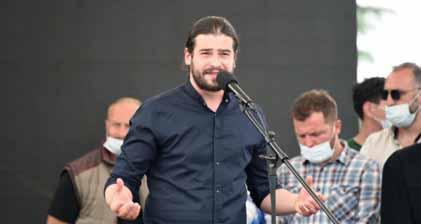
Varlam Goletiani, one of the organizers, says that the police forces have been transporting Enka workers onto the site in their own vehicles. Source: Facebook
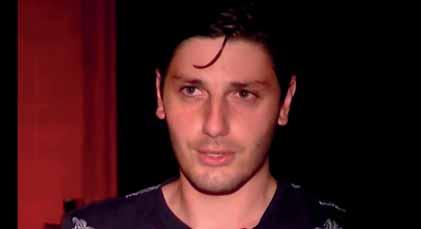
Zurab Khmelidze, Assistant Detective / Investigator in the Vani District, has expressed his solidarity with the Rioni Valley Guardians by resigning. Source: Netgazeti.ge
Ukraine’s PM Visits Georgia, Discusses NATO and Regional Security
BY TEAM GT
Irakli Garibashvili, Prime Minister of Georgia, made a state visit to the Republic of Turkey this week, during which he met with President Recep Tayyip Erdogan.
Turkey has been a number one trade partner for Georgia in the past 14 years, and the economic cooperation between the countries is expected to further increase. The Turkish president noted that Turkey regards Georgia as “a key to regional cooperation.”
“This year is signifi cant as we are marking the 100th anniversary of the diplomatic presence of Georgia in Ankara and the 30th anniversary of the Regained
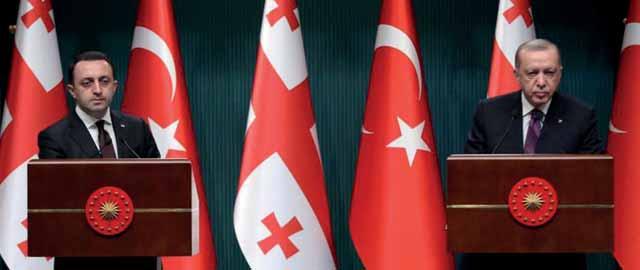
Independence of Georgia,” Erdogan said after his meeting with the Georgian PM. “We discussed signifi cant topics of our bilateral relations at a face-to-face meeting, which was followed by discussions between our delegations.
“Turkey has been a Number One trade partner for Georgia in the past 14 years. Irrespective of the fact that 2020 saw a slight decline in trade volumes, we still aim to increase the trade turnover to $3,000,000.000 in the near future. Negotiations and consultations are also in progress towards extending a Free Trade Agreement,” he said.
“At the same time, we are strongly committed to increasing the trade potential and to advance cooperation between our customs administrations. The same applies to the energy sector and all other areas, which benefi t from Turkish investments to a total of $214,000,000.000.
“We have projects of great signifi cance implemented with and in Georgia, which transform the region altogether,” Erdogan highlighted. “The South Gas Corridor is among such strategic projects. We created this platform on the grounds of it. We have initiated multilateral cooperation through interconnecting mechanisms and various combination corridors. We have built a corridor within this scope, currently labeled as the East-West Corridor, connecting the Caspian Sea from the Caucasus to China through Turkey.
“One of the key segments of the Silk Road, the Baku-Tbilisi-Kars (BTK) Railway, transports international cargo from our country and Russia. We discussed the prospect of increasing this railway throughput via the Marmaray Tunnel.
“We also discussed the fi ght against terrorism, particularly focusing on the efforts against the Fethullahist Terrorist Organization (FETO).
“We exchanged our views on regional matters. Turkey regards Georgia as a key to regional cooperation. We strongly believe we have all the means to carry out various efforts to strengthen and increase the signifi cance and peace in our region. Within the scope of this endeavor, tripartite cooperation is very important, with the engagement of Azerbaijan. Turkey supports any tripartite cooperation, be that Georgia-AzerbaijanArmenia or Georgia-Azerbaijan-Turkey.
“We also made a decision to hold a high-level meeting of the strategic council any time this year, and we instructed the Foreign Affairs Ministries of Georgia and Turkey to work on the timeframe. We continue to make bold steps forward by using the available mechanisms. With this mindset, I express hope and remain confi dent that our views and meeting will facilitate and develop the current relations between our nations,” Erdogan said. In turn, the Georgian PM stated that Turkey has been an important friendly country and strategic partner for Georgia, and expressed readiness for future collaboration.
“You noted very rightly that Turkey has been a Number One trade partner for Georgia over many years now,” Garibashvili said. “We have jointly implemented such signifi cant projects as BakuTbilisi-Ceyhan (BTC), Baku-Tbilisi-Kars (BTK), Tbilisi-Erzurum.
“During our visit, we had a very productive discussion, covering practically every topic related to the cooperation between our two nations. I wish to use this opportunity and publicly express my gratitude personally to you for supporting the sovereignty of our country. Also, I wish to note that Turkey has always been supportive of the sovereignty of Georgia and its aspiration towards NATO membership in every existing format. I also wish to echo the statement made by the President in relation to the upcoming meeting of the strategic council, which I truly look forward to. Destiny has made our three nations - Azerbaijan, Georgia and Turkey - interdependent. We have very strong cooperation, partnership and, what is most important, friendship. A very strong basis exists for implementing more joint projects in future both in bilateral and trilateral formats."
BUSINESS Turkmenistan’s Economy Stumbles, While Succession Looms
ANALYSIS BY SOLOMON ALVARES
Several negative trends are converging on the Turkmen ruling elite, with the economy causing social discontent and occasional protests among the country’s population. And with succession plans being rolled out, it is doubly important for the government to keep a semblance of stability by squashing signs of dissent.
Turkmenistan is witnessing its worst economic crisis since the 1990s. The pandemic caused infl ation, and food shortages are widespread, resulting in protests across the country which exacerbate an already tense social order.
But troubles were present well before the coronavirus hit. Low gas prices and the suspension of gas exports to Russia between 2016 and 2019 worsened the situation. Moreover, food supply chains have been in decline for several years. Caused by poor harvests, the looming crisis led the majority of the population to have to shop at government-operated stores because these have lower prices than private markets. The choice is a diffi cult one: between diminished rations at state stores or purchasing products in expensive shops. Overall, faced with serious revenue shortfalls, the government has increasingly shifted fi nancial burdens onto the people.
Although the country denies the existence of COVID-19, the pandemic has nevertheless exacerbated the economic woes, setting off public dissent in 2020. Protests became widespread, and though they are economically motivated and have not transformed into coordinated actions, they nevertheless could prove existentially dangerous for the government. The protests have been territorially dispersed, which shows the depth of troubles which touched all corners of the large country. In April 2020, a group of several dozen people, mainly women, from villages on the outskirts of the city of Mary briefl y blocked the major road which connects the city to the rest of the country. The following day, people gathered outside the Mary Provincial Administration to complain about the hyperinfl ation and the shortage of such essentials as fl our and cooking oil.
The economic diffi culties continue to beset Turkmenistan. Recent scant reports indicate that the situation has not been corrected. For instance, provincial authorities banned queuing outside state stores following Deputy PM Serdar Berdymukhammedov, the president's son and heir apparent, statement that "crowds near stores discredit" his father. According to the order issued in the eastern city of Turkmenabat, queues at stores could consist of no more than four people. The new ban was introduced amid an economic and food crisis. As an example, presently, state stores are open for subsidized food only from 6-8 am and only a certain amount of cotton and sunfl ower oil, sugar, and rice is available per person per month.
The queues relate to the subsidized prices for basic goods and utilities – measures used by Berdymukhammedov, similar to his late predecessor, Saparmurat Niyaziv, aim to help the current leadership to stay in power by containing and eventually subduing public discontent.
On April 13, in the southern city of Mary, about 1,000 people waited for hours to buy two kilograms of frozen meat each. One kilogram of meat cost 36 Manats, which is equal to $10 at the state-controlled rate, and $1 on the black market.
Economic problems are also evident in the country’s currency. In April, it was reported that the Manat had reached 40 to the Dollar. This is some 50% down since the beginning of the year when the Manat was trading on the black market for around 27 or 28 to the Dollar. The currency troubles began in March 2020 following Beijing’s decision to slash gas imports, and due to the generally low prices China had been paying for Turkmen gas.
These economic woes are happening at a time of widespread speculations on succession. Recently, President Berdymukhammedov, aged 63, appointed his son Serdar to a number of top positions, among them deputy prime minister, which also gives him a seat on Turkmenistan’s Security Council, as well as the head of the government’s audit chamber. Before that, Serdar had served as Deputy Agriculture Minister and manager of the already non-existant State Agency on Management and Use of Hydrocarbon Resources. And there are many more positions. But what is more important, Serdar is being groomed as a national leader too, by meeting important regional political fi gures – a clear indication of his ambitions.
All indicates that a power struggle within the government is unlikely to take place, but in any case, a peaceful transition is what matters to the Turkmen leadership. Though the opinions of ordinary Turkmen are not heeded, appearances are what matter to help guarantee the continuity of the Berdymukhammedov dynasty, and it largely explains the government’s efforts to quash any visible signs of public discontent.
The overall dire economic situation, however, does pose a novel threat to the autocratic Turkmen government, which could unnerve the entire façade of power. Yet, one should bear in mind the geography of the country. Discontent is widespread and felt across the country, and occasional protests are taking place, but these are far short of a concerted effort. Geography no doubt goes some way to preventing resistance, as there are hundreds of kilometers of sparsely inhabited, mainly desert, land between major population centers, making it easier for the central government to shut entire cities in case major troubles begin.
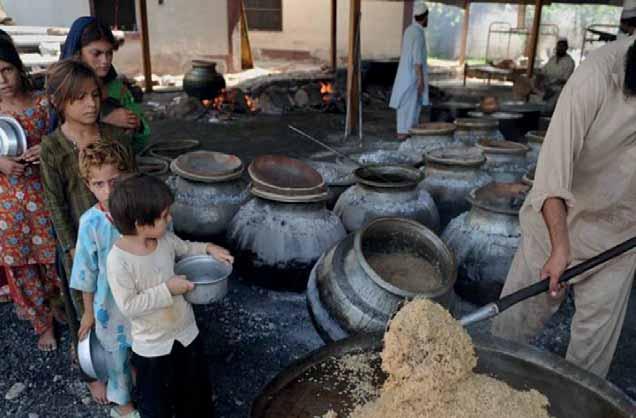
State stores are open for subsidized food only from 6-8 AM, and only a certain amount of cotton and sunfl ower oil, sugar, and rice is available per person per month. Source: asianews.it






